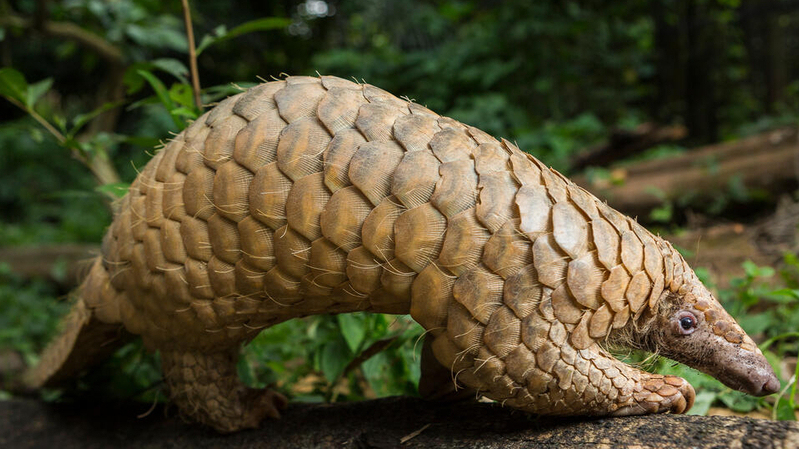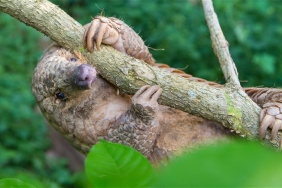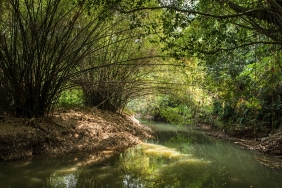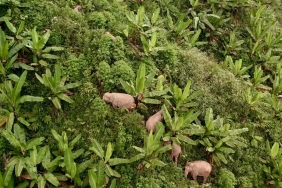THE SUNDA PANGOLIN (MANIS JAVANICA): SWEET IN NAME, NOT AS SWEET IN FATE
The rich biodiversity of Indonesia has made the country an important source of distribution and market for endangered and high-value wildlife. One of the animals targeted by poachers and illegal traders today is the Sunda Pangolin (Manis javanica). This species is traded for its body parts, such as meat, tongue, skin, and scales, which are believed to be effective as traditional medicine for the Chinese people and also as raw materials for drugs. Consuming pangolin parts, which are considered exotic food, is also seen as prestigious (Zhou, 2014). Before being known as a raw material for traditional Chinese medicine, pangolin scales were used as raw materials for making handicraft bags, wallets and other accessories. Meanwhile, its meat was utilized as a luxury dish and a source of protein for local people.
Pangolins are one of the most sought-after animals in the global black market. China's demand for pangolin meat and scales is estimated to be around 100,000-135,000 kg per year. The pangolin trade has been going on since the 1990s, when pangolins were exported from Indonesia to other countries (Mohapatra, 2015). Data from Tirto.id states that between 1999 and 2017, there were at least 192,567 individual pangolins involved in the illegal trade.
In the course of action, pangolin body parts and whole pangolins are smuggled in various ways. Smuggling gangs move very quickly, using more than 150 different routes and adding nearly 30 new routes every year.
The pangolin is a unique scaly mammal, the only one in the Pholidota family. Their scales, which serve as a means of protection from prey, are unfortunately now a threat as they have become a target for poaching, leading to their Critically Endangered (CR) status according to the red list of the world's conservation organization, IUCN. This is despite the fact that this species is protected under Law Number 5 of 1990 concerning the Conservation of Natural Resources and Ecosystems. Not only that, its status in CITES (Convention on International Trade in Endangered Species) is Appendix 1, which means it cannot be traded.
Why are pangolin scales used as one of the raw materials for drugs? It turns out that the scales contain the addictive substance Tramadol HCI, which is an analgesic addictive substance to treat pain, and is a substance binding particle in psychotropic methamphetamine.
Unfortunately, the exact population size of pangolins in Indonesia is still unknown. This is an obstacle to pangolin conservation. However, the rampant poaching and illegal trade of pangolins has clearly caused the population to drop drastically. The species' decline is compounded by its life span, which only reaches a maximum age of 7 years, as well as weak law enforcement for poachers and traffickers.
The persistence of pangolin scales possession and trade even occurs in the Heart of Borneo, an area of Borneo's tropical forests that is the initiative area of three countries, Brunei Darussalam and Indonesia.
Although the population size is unknown, the information obtained is that this animal has been difficult to find in nature. What is the impact of pangolin loss in the wild? Pangolins in the wild have no direct impact on humans, but their ecological role as an animal that likes to dig the soil in the forest in search of ants or other insects, is able to loosen the forest and smooth the biogeochemical cycle of the forest. The behavior of eating ants or other wood insects also indirectly maintains the process of tree regeneration, which provides oxygen for humans. With the pangolin's many roles in the ecosystem and the need to maintain its population in the wild, it is a common challenge to protect pangolins in Indonesia.
According to the IUCN Pangolin Specialist Group, the Sunda Pangolin will become extinct in the wild if we do not stop illegal hunting and trade. There are several solutions to curb the pangolin trade and slow down the extinction rate in Indonesia, including: Coordination and cooperation with law enforcement, Director General of Customs and the Financial Transaction Analysis Reporting Center (PPATK); Encouraging the courts and prosecutors to impose severe penalties for pangolin possession and trade; And encouraging the government to finalize the revision of Law Number 5 of 1990 concerning the Conservation of Natural Resources and Ecosystems.
Let's crack down on pangolin and other protected wildlife trade together. You can contribute to the eradication of illegal trade in protected plants and wildlife by becoming a watchdog. Keep an eye out and report if you find this illicit trade practice, through the Protected Wildlife e-Reporting application.





